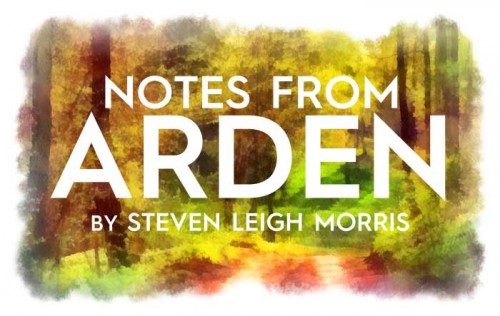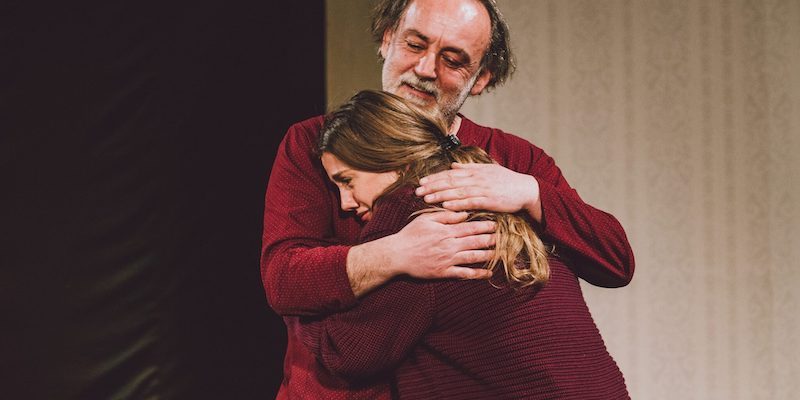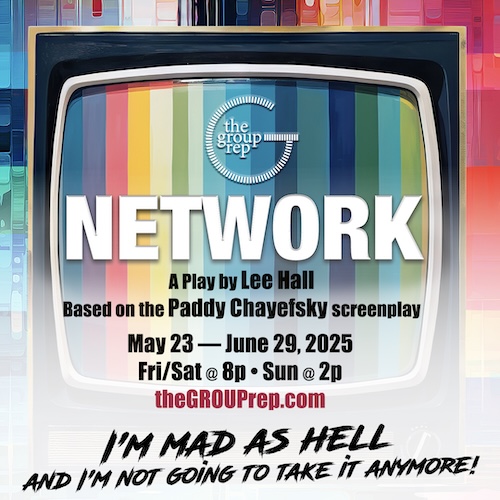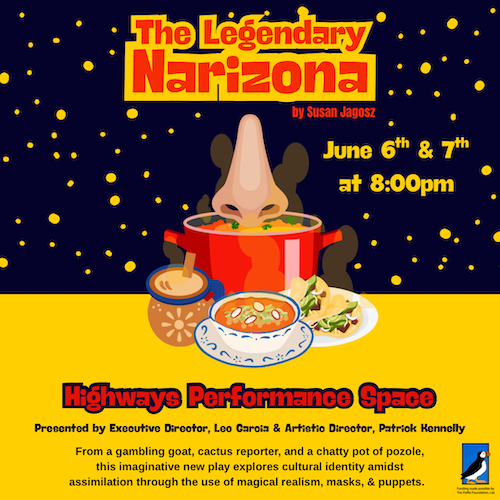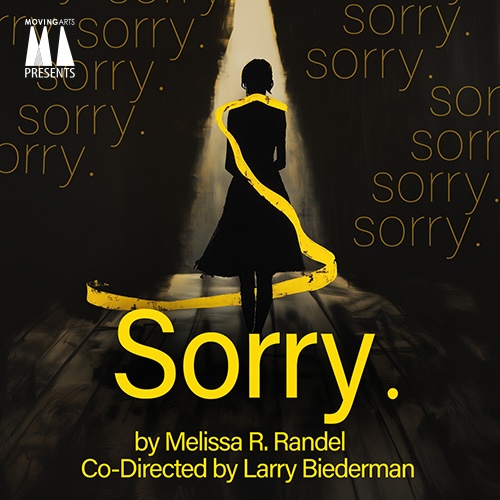
An International Theater Festival Ponders Consequences of Bullying and Marauding
By Steven Leigh Morris
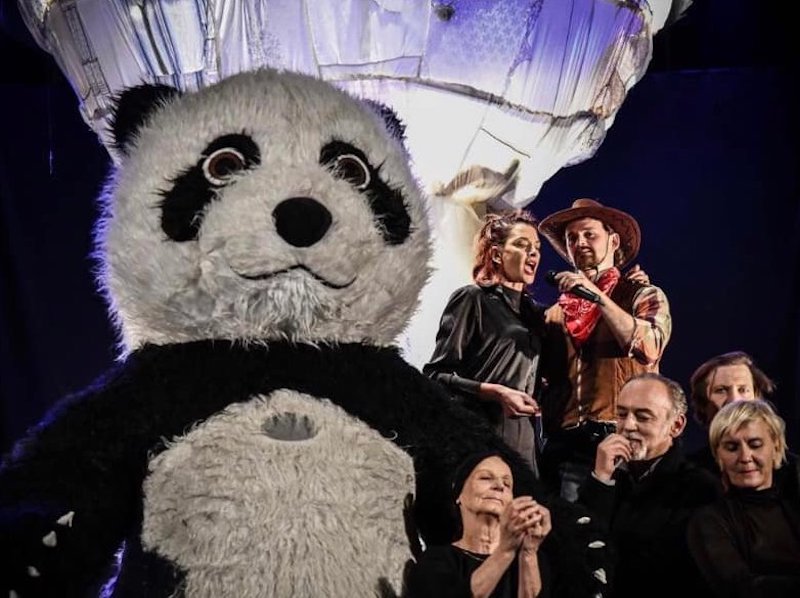
“Negotiating Peace” at the Oda Theatre, Prishtina, Kosovo: Emma Andrea, Harald Thompson Rosentrom, Meli Qena, Shkumbin Istrefi, Ejla Bavcic, Martin Koiv (Photo by Atdhe Mulla)
The history of human behavior is a history of bullying and marauding, of one group looking at another and saying “You’re less than me, so your land should be mine. Your house should be mine.” It starts from, “I’m superior to you,” then sometimes leads to “You have no right to exist.” If the marauding group is benevolent, the approach may well be, “With my permission, you may live in this gutter, while I live up there on the hill. What? Of course you can live on the hill if you can afford it. You can’t afford it? Is that my fault? See how open-hearted I am, I’m not evicting you. I’m not exterminating you.”
More often than not, bullies and marauders don’t even pretend to be benevolent.
This means that the history of human behavior is also a history of accrued wounds, followed by resentments, followed by grievances, often followed by vengeance. Yet fury not only punishes the innocent. Over time, it corrodes the souls of the furious.
This is pretty much all that the ancient Greek poets and philosophers and playwrights, from Aeschylus, to Homer, to Sophocles, wrote about, starting circa 400 BCE. They were trying to fathom the lunatic barbarism of bullying and marauding, the pointless, eternal cycles of revenge, the needless misery it causes to people who have nothing to do with it, people simply trying to live their lives, dare it be said, in peace.
This is stepping into the mire, but here goes: Imagine if, in October, 2023, Benjamin Netanyahu had channeled Gandhi, via Dr. Martin Luther King, instead of George W. Bush. Imagine if Netanyahu had not responded to Hamas’s indefensibly barbaric attack on his nation with such overreactive vengeance, which has only exacerbated a new era of global anti-Semitism, anti-West terrorism and, by extension, Islamophobia. By falling into the trap of vengeance, echoing the folly of the United States in Iraq and Afghanistan after the 911 attacks on New York, Netanyahu is giving Hamas everything it sought, an outcome cheered by Iran, North Korea and Russia. There’s a great gap between fury and wisdom, between belligerence and strength.
Imagine if Netanyahu had said, instead, “We will take our revenge, but it will be on our terms, in our time.” What if he’d remained stoic, showing actual strength of character (and resolve) rather than rage. Imagine if he’d said, instead, “I’m not falling for this. I know where this leads.” (There are enough precedents for where it leads, in every corner of the world, in every epoch.)
Imagine.
I write this as a backdrop to the international Kosovo Theatre Showcase in late October, presented in Prishtina and outlying cities such as Gjakova and Gjilian (yes, like Jack and Jill). This is the third successive annual festival I’ve attended in Kosovo. Each has been largely a response to the genocide on this very soil, and in living memory, perpetrated by Serbian strongman Slobodan Milosevich, as Muslim Kosovo was trying to release itself from the grip of Orthodox Serbia by becoming its own country. These tensions escalated when the former Yugoslavia was fracturing in the 1990s. It was then that U.S. President Bill Clinton and his Secretary of State Madeleine Albright (both have statues in the city center) led United Nations bombing strikes that ended the conflagration. Kosovo became a nation in 2008. The government of its next-door neighbor, Serbia, still refuses to recognize its existence.
As David Brooks recently opined in “How To Stay Sane in Brutalizing Times,” his Nov. 2 New York Times essay, “The essence of dehumanization is not to see someone.”
Some two months before the start of this year’s theater festival, Serbian troops were again amassing on Kosovo’s border in the north. Only after U.S. Secretary of State Anthony Blinken warned the Serbs to stand down was yet another Balkan crisis averted.
The Right to be Seen and the Right to Be Heard
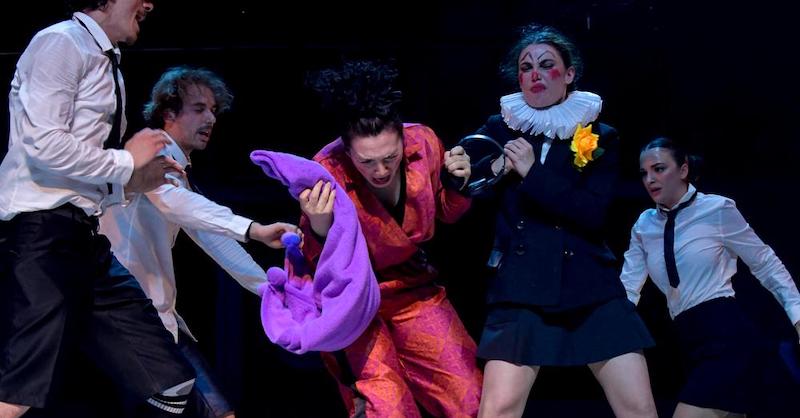
“Gadjo” at the Oda Theatre, Prishtina: Rafael Joxhaj, Blend Sadie, Edona Reshitaj, Juli Emiri, Verona Koxha (Photo by Atdhe Mulla)
The festival opened with a well-intended panel discussion called “Theater in Times of Social Crisis,” later to be dubbed “the car crash panel” by those who attended. (I arrived the following day but heard about it from the principals involved.) The scheduled panelists hailed from Ukraine, Northern Ireland, Greece, Palestine and Israel.
The Palestinian delegate was unable to attend due to her being trapped in Gaza in the wake of bombings there. (Meanwhile, the Israeli delegate was trapped for weeks outside his country, for similar reasons.) In the days before the scheduled discussion, the panelist from Greece reportedly contacted festival staff by email saying she felt uncomfortable with the format that allowed for a presentation of the Israeli perspective without a Palestinian view to counterbalance it.
According to festival staff, on the day of the panel, there was a proposed change in format, which replaced the scheduled presentations with an elongated discussion directly with the audience on the role of theater in times of social crisis. The Israeli panelist was incensed by this change of plan, believing that he was the victim of secret machinations, censorship, and anti-Semitism. (He’d brought graphic photos of the Israeli victims of Hamas’s attack on Israel, he told me, that could no longer be shown.) The public discussion happened, but not before the Israeli delegate had verbally lashed out, in public, at both the Greek panelist, who consequently removed herself from the panel, and the British moderator — casting a pall over the event.
This may all sound idiosyncratic and unfortunate, but it is, in fact, a telling illustration of tensions stemming from current events that are echoes of conflicts dating back through the millennia. It’s as though ghosts from across the globe and from centuries past had arrived in Prishtina with the aim of making mischief. The individual panelists were merely their playthings.
How does one respond to this Israeli theater artist, exiled from his own country due to war, who has valid historical and contemporary reasons to feel persecuted (though not by this festival)?
When I arrived in Los Angeles after the festival, my inbox at California State University, Dominguez Hills, where I teach, was populated with a chain of missives starting with a campus wide (faculty and students) “Statement of Solidarity with the People of Gaza and the Palestinian Diaspora.” This statement was sent by an associate professor from the Department of Chicana/O Studies, and signed by multiple faculty members from that department, and others.
“We are in deep solidarity with the people of Gaza,” it started, and went on to castigate the “long history of Israeli settler colonial violence and occupation of Palestine.” Perhaps they meant the West Bank settlers who have been behaving appallingly, but the declaration didn’t specify. It was interpreted by one Jewish faculty member as code for Israel in general, who (I’m paraphrasing here) replied, Thanks a lot. You’ve just made it scarier than ever to meet my classes when anti-Semitism in spiking world-wide, and particularly on American university campuses. Another faculty member barked at the activists (again, paraphrasing), What makes you presume that the entire university population cares about your opinion? Take me off your list and don’t use my campus email for this kind of messaging again. Meanwhile, a female Muslim professor weighed in, agreeing with all sides that such a reductive Statement can only inflame tensions: Anti-Semitism and Islamophobia, making the campus a more dangerous place. The final argument came from a lecturer who argued that to espouse his personal opinions is not in his job description and besides, for each of his many opinions, there’s a valid counter-opinion. His job, and the job of the university, he wrote, is to nurture critical thinking, and such a one-sided anthem of principle, he concluded, serves the opposite purpose.
I bring this up because it cuts to the core of the matter, of how theater might buoy up our humanity at a global moment when the values of empathy and what it means to be humane are so under siege, on so many fronts.
I was grateful for this “Statement of Solidarity,” not because I thought it was any good. It held some truth, though expressed in a doctrinaire, unforgiving style. It was a point-of-view, a narrow point-of-view. But what followed was email after email that systematically dismantled its belligerence that was posing as virtue, its sweeping self-righteousness that was posing as enlightenment. Email after email, from a Jewish perspective, from a Muslim perspective, from a non-theological perspective, each dissecting the logic of the Statement, its purpose, and its consequences. Angle after angle. Nobody was censored. This was critical thinking at its best — impassioned yes, but resulting in something resembling insight, a broader perspective.
No single email contained the whole truth, as no single character embodies the whole truth in a great play. It was the accruing of insights that unfolded like an ancient Greek tragedy, containing the unspoken warning: Don’t imagine you can see everything from your lowly mortal station. You have no right to be sanctimonious. The gods will crush you for the folly of your certainty. Be more humble. Being humble is not humiliation, it’s wisdom. It’s the recognition that you may be blind, though you imagine you see everything. And finally, the best part: Your rage will be your undoing. Try kindness, instead.
Theater as a Bridge Across Hostile Divides
The Kosovo festival director, Jeton Neziraj, is also his country’s national playwright. This year, the festival included two of his plays (almost all of them are centered on global social and political events) directed by his wife, Blerta Neziraj, who is singularly capable of elevating his Brechtian texts into surreal and absurdist worlds that layer their productions with outrageous humor. These toppings of levity not only provide an escape valve from the playwright’s justifiably cynical if not dystopic view, the farce is very much part of that view. In aggregate, the Nezirajs’ productions are a latter-day stylistic echo of Stanley Kubrick’s 1964 film Dr. Strangelove: How I Learned to Stop Worrying and Love the Bomb.
Yet there’s more to this madness than the shrieks of mirth emanating from the asylum. Some of their productions (Balkan Bordello, 2021; The Handke Project, 2022; and this year’s Negotiating Peace), co-produced with international companies, utilize casts populated by actors arriving to rehearsals from rival nations, i.e. Kosovar and Serbian actors working side by side, sometimes with Americans, Italians and Croats, etc. The purpose, as these productions tour across Europe and sometimes into the United States, is to entice audiences from those rival nations to see themselves represented in this larger, animated game of Monopoly, underscoring the view that they, the audiences, are not petty, brutal and insane. Rather, the game itself is petty, brutal and insane, as it compels them to be participants in it.
In this way, the festival’s principal producing entity, Qendra Multimedia, aims to use theater (and literature — the organization also hosts a book festival) as a means to build bridges across hostile divides. It’s a rope bridge and it sways — as fragile as it is flexible.
Negotiating Peace, performed in English, was presented in Prishtina’s Oda Theatre. The production is currently on a European tour, produced in association with Teatre della Pergola (Italy), euro-scene Leipzig (Germany), Prague City Theatres (Czech Repulbic), R.A.A.A.M (Estonia), Mittlefest (Italy), Kontakt (Bosnia and Herzegovina), Black Box Theatre (Norway) and My Balkans (USA/Serbia).
It’s a theatrical spinning top loosely based on the Dayton Accords, which put a negotiated end to the Bosnian War in 1995. The script starts with a movie parody, a grim yet blithe scene of gravediggers excavating and measuring what’s left of corpses from the genocide. But the production opens with a massive, inflated Panda puppet, perhaps two stories tall, staring at the audience. The puppet never says anything. It ambles off just before the first scene, and returns after the final scene. This is the kind of directorial flourish referred to earlier that defies explanation, propelling the story of diplomats and generals and the farcical reasons that a peace treaty actually gets signed, into the upper stratosphere of a dream — not some sacred space, more like the world of Lewis Carroll. It’s refreshing to see an approach to diplomacy that’s not couched in realism (though the play is heavily researched). The entire production pokes docudrama in the eye.
And yet, the world may be moving faster than this spinning top (with its bevy of diplomats taking a time-out to dance on the donut shaped table-top), however surreal its ambitions. In one scene the diplomats come one hair shy of fist-fighting before the scene stops and a narrator explains that this is not the way things went down. And the scene is repeated with diplomatic protocol, and the same threat of a fist-fight buried in the sub-text. In fact, as reports demonstrate from the U.S. House of Representatives in its search for a leader, that first version may now be more accurate in an age when protocol is among the institutions being decimated by resident nihilists in every government.
There’s also a female civil society activist among the diplomats. The play pokes fun at her singular obsession with climate change, while everyone around her is aiming to stop an ongoing genocide. The swipe is out of the “The house is on fire and you’re trying to fix a leak under the sink” jokebook, trivializing the danger that climate change may well be among the causes of the next round of genocides.
These are among the reasons I preferred the Nezirajs’ other production, Gadjo (The Young Europeans) also in the Oda Theatre, presented in Albanian with English super-titles, and produced by The National Experimental Theatre of Tirana (Albania), in association with Qendra Multimedia (Kosovo).
This is a story, also plucked from the news and lifted far beyond the world of docudrama, under Blerta Neziraj’s direction. It’s the story of a female Roma refugee “dressed like a man,” forcibly returned from Belgium to Kosovo on contrived charges of stealing children. At first the Belgian bureaucracy conspired against her, and then a cadre of young Kosovar thugs beat her up, leaving her for dead.
The play isn’t about her. She’s less a character than a symbol. She is, after all, the personification of virtue and innocence, and the production’s take on her is almost sentimental. The play is actually about the lost generation of Europeans, male and female, for whom economic opportunity has evaporated. British playwright Steven Berkoff often talked about “yobs” in the UK; In 1988, American playwright Howard Korder wrote a play, Boys’ Life, about a lost generation of Americans; this is a 21st century, European update.
The production’s target is the emotional and economic foundations of bigotry, and its relevance blazes across the Atlantic Ocean as anti-Semitism, Islamophobia and other hatreds of entire groups turn increasingly violent on American shores, for much the same reasons. There’s a case that this is a symptom of what’s come to be known as “late stage capitalism,” a global phenomenon, which ensures that the distribution of wealth is increasingly polarized, leaving groups of youth disenfranchised, feeling increasingly hopeless and ready to lash out. It would be comforting to believe that providing more economic opportunity is the antidote to racism, but that’s just a small part of the equation — a theory contradicted by the history of bigotry by landed aristocracies of the past, and some billionaires of the present. Is bullying that’s attached to the narcissistic disregard of others simply hard wired into DNA of some people? Most people?
Gadjo may not be as ambitious a play as Negotiating Peace, but its aim is more true. And Blerta Neziraj’s sometimes ribald directorial style settles into a pathos that settles further into terror. And that’s no joke. Nor is it treated as such.
The theme of bullying takes a different turn in Oda Theatre’s production of a beautiful play, Arbri, spoken in Albanian, written and directed by Lirak Çelaj. Inspired by Florian Zeller’s 2020 film, The Father, starring Anthony Hopkins, it’s an excursion into surrealism via dementia.
On the only kitchen set I saw in this festival, an elderly man converses with two of his daughters, one of whom may or may not be his caretaker, and a physically abusive son-in-law, perhaps, who also may or may not be his caretaker. As soon as one starts scratching one’s head as to who is who, and what is real, the realization dawns that we’ve crawled inside the crumbling mind of the father. Thanks to Shkumbin Istrefi’s title role performance, as emotionally harrowing as it is alarming, the production reveals the discomfiting world of elder-abuse and the fraying of one victim’s capacity to defend himself. The production serves up a kind of Beckettian social realism, which sounds like a contradiction in terms. But on this stage, it’s not.
Classical Gas
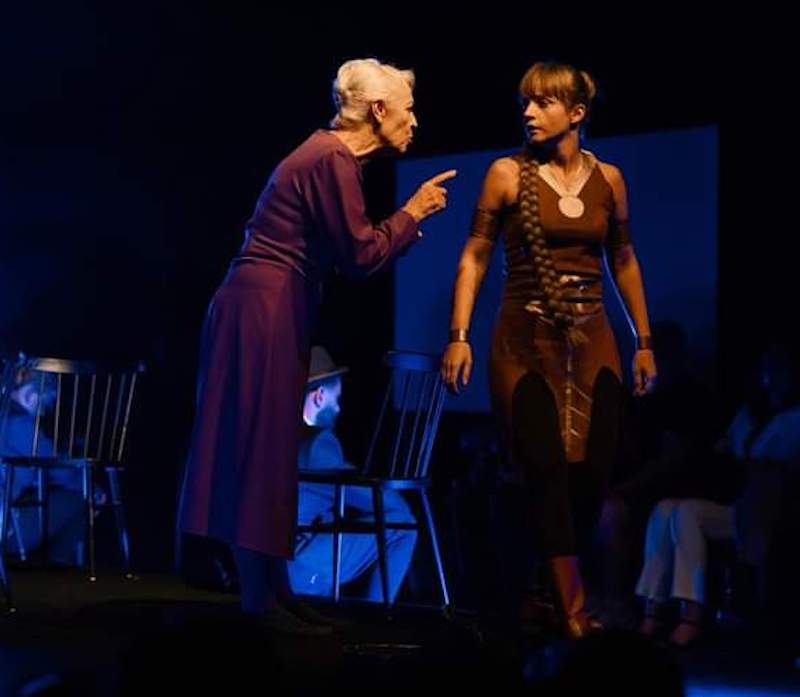
“Antigones” City Theatre of Gjakova: Myrvete Kurtishi, Vlora Dervishi (Photo courrtesy, City Theatre of Gjakova)
Things turned earnest in two other festival productions. It was quite the counterpoint: watching characters who mean what they say, and say what they mean. In both of these productions, one simply couldn’t locate the Nezirajs’ brand of irony-upon-irony. (Variety is the spice. . .)
This is because, though intended or not, both of these plays hewed closely to the rules of the road laid out by the ancient Greeks, whose characters are (almost) stunningly void of duplicity. One of these productions was partly penned by Sophocles, with a little help from 20th Century Frenchman Jean Anouilh. That would be Antigone, or, in local parlance, Antigones, in an Albanian-spoken production presented by Hadi Shehu City Theater of Gjakova.
GJakova is a once-Ottoman city dating back to 1485 that’s been a center of ethnic violence for centuries. The most recent atrocity (cited by the United Nations in its long roster of human rights abuses) occurred on April 27, 1999, with the mass killing of over 377 Albanian males between the ages of 16 and 60 by Serbian police. This was the single-largest massacre of the Kosovo War. The city center was destroyed by Serbian forces, and has since been rebuilt.
That fateful day remains seared in living memory, and Antigones — director Person Zymberi’s blending of a quasi-19th century American West with an Ancient Greece ambience — remains a traditional testament to the still palpable grief. It is, after all, about burying the dead; about a young woman, Antigone (the powerful Vlora Dervishi), defying her uncle, King Creon, by giving her late brother (whom Creon believes was a traitor) a dignified burial. For her devotion and defiance, Antigone is ordered by her uncle-king to be entombed alive. (In Oedipus the King, Creon was a voice a reason. How the mighty fall.) Here, we see the vault rising, brick by brick. Each brick, like a tombstone, contains the name of one of the men of Gjakova murdered by Serbian police in 1999.
British playwright Sarah Hehir’s memorial to the victims of a different Serb massacre in Podujeve (in the north of Kosovo near the Serbian border), was staged in a different city, Gjilan, also near Prishtina. Her play, The Shadow Garden, is part docudrama, part poem and part fantasia, developed after years of visiting Kosovo and speaking with the affected families. It was produced by the Gjilan City Theatre and presented in Albanian with English super-titles as part of this year’s Kosovo Theatre Showcase.
The central structure is a war crimes tribunal. It follows the children of the Bogujevci family, who were the first children to give evidence. The play is also populated with ghosts, while eagles from both Serbia and Kosovo provide animated symbols of conflict. It also includes poignant scenes that imagine an alternate future.
Euripides’s The Trojan Women is a close literary relative, a lament by the women now at the mercy of occupiers. In The Shadow Garden, however, the survivors are at the mercy of their memories, suggesting that in a war as savage as this, there are no victors, just survivors. The rest is an arduous process of recovery.
Some effective videography (Al Orange), underscoring the play’s docudrama aspects, were among the virtues of Nastajza Domaradzka’s direction. Still, the play’s tonal essence was difficult to locate. This is an elegant and important play that warrants, perhaps, a more spartan staging in order to play to its strengths.
Maybe the cautions of the ancient Greeks still apply: Be kind. Your rage will be your undoing. Can that even be processed by bigots in the U.S., by yobs in the U.K., by the Young Europeans — when they already feel undone?
Can that be processed by the Trumps and the Putins and the Netanyahus and the Orbáns and Miloševićs, and the leaders of Hamas, who truly believe, or seem to believe, that to own the world is their entitlement and their destiny?
Is there an alternative future, as in Hehir’s play? And can the theater help take us there?
It can be argued that it already has. The Shadow Garden imagined it. Neziraj’s plays imagine it. That’s the start.
Imagine.

